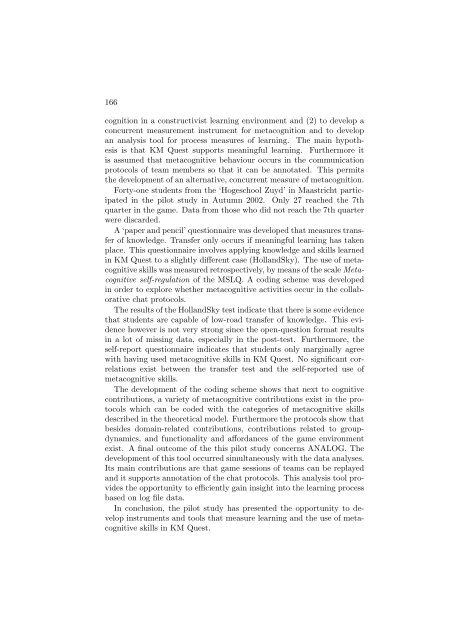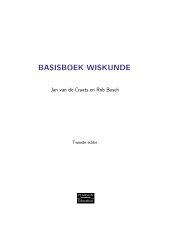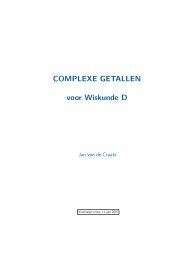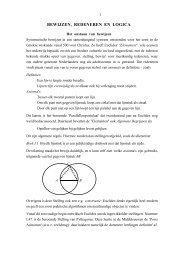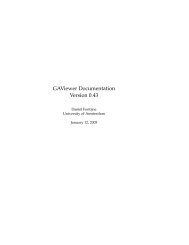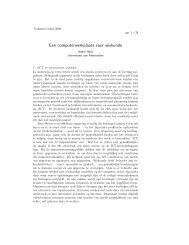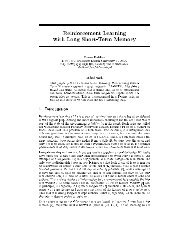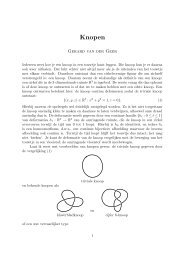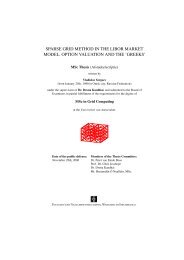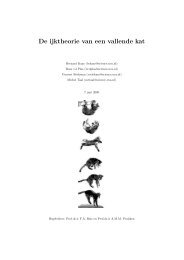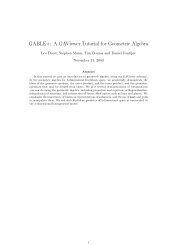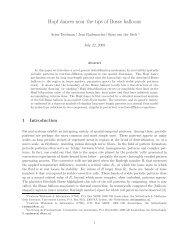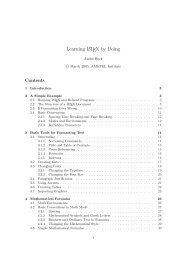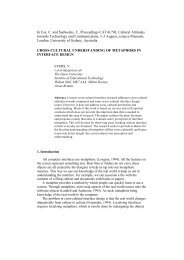The role of metacognitive skills in learning to solve problems
The role of metacognitive skills in learning to solve problems
The role of metacognitive skills in learning to solve problems
You also want an ePaper? Increase the reach of your titles
YUMPU automatically turns print PDFs into web optimized ePapers that Google loves.
166<br />
cognition <strong>in</strong> a constructivist learn<strong>in</strong>g environment and (2) <strong>to</strong> develop a<br />
concurrent measurement <strong>in</strong>strument for metacognition and <strong>to</strong> develop<br />
an analysis <strong>to</strong>ol for process measures <strong>of</strong> learn<strong>in</strong>g. <strong>The</strong> ma<strong>in</strong> hypothesis<br />
is that KM Quest supports mean<strong>in</strong>gful learn<strong>in</strong>g. Furthermore it<br />
is assumed that <strong>metacognitive</strong> behaviour occurs <strong>in</strong> the communication<br />
pro<strong>to</strong>cols <strong>of</strong> team members so that it can be annotated. This permits<br />
the development <strong>of</strong> an alternative, concurrent measure <strong>of</strong> metacognition.<br />
Forty-one students from the ‘Hogeschool Zuyd’ <strong>in</strong> Maastricht participated<br />
<strong>in</strong> the pilot study <strong>in</strong> Autumn 2002. Only 27 reached the 7th<br />
quarter <strong>in</strong> the game. Data from those who did not reach the 7th quarter<br />
were discarded.<br />
A ‘paper and pencil’ questionnaire was developed that measures transfer<br />
<strong>of</strong> knowledge. Transfer only occurs if mean<strong>in</strong>gful learn<strong>in</strong>g has taken<br />
place. This questionnaire <strong>in</strong>volves apply<strong>in</strong>g knowledge and <strong>skills</strong> learned<br />
<strong>in</strong> KM Quest <strong>to</strong> a slightly different case (HollandSky). <strong>The</strong> use <strong>of</strong> <strong>metacognitive</strong><br />
<strong>skills</strong> was measured retrospectively, by means <strong>of</strong> the scale Metacognitive<br />
self-regulation <strong>of</strong> the MSLQ. A cod<strong>in</strong>g scheme was developed<br />
<strong>in</strong> order <strong>to</strong> explore whether <strong>metacognitive</strong> activities occur <strong>in</strong> the collaborative<br />
chat pro<strong>to</strong>cols.<br />
<strong>The</strong> results <strong>of</strong> the HollandSky test <strong>in</strong>dicate that there is some evidence<br />
that students are capable <strong>of</strong> low-road transfer <strong>of</strong> knowledge. This evidence<br />
however is not very strong s<strong>in</strong>ce the open-question format results<br />
<strong>in</strong> a lot <strong>of</strong> miss<strong>in</strong>g data, especially <strong>in</strong> the post-test. Furthermore, the<br />
self-report questionnaire <strong>in</strong>dicates that students only marg<strong>in</strong>ally agree<br />
with hav<strong>in</strong>g used <strong>metacognitive</strong> <strong>skills</strong> <strong>in</strong> KM Quest. No significant correlations<br />
exist between the transfer test and the self-reported use <strong>of</strong><br />
<strong>metacognitive</strong> <strong>skills</strong>.<br />
<strong>The</strong> development <strong>of</strong> the cod<strong>in</strong>g scheme shows that next <strong>to</strong> cognitive<br />
contributions, a variety <strong>of</strong> <strong>metacognitive</strong> contributions exist <strong>in</strong> the pro<strong>to</strong>cols<br />
which can be coded with the categories <strong>of</strong> <strong>metacognitive</strong> <strong>skills</strong><br />
described <strong>in</strong> the theoretical model. Furthermore the pro<strong>to</strong>cols show that<br />
besides doma<strong>in</strong>-related contributions, contributions related <strong>to</strong> groupdynamics,<br />
and functionality and affordances <strong>of</strong> the game environment<br />
exist. A f<strong>in</strong>al outcome <strong>of</strong> the this pilot study concerns ANALOG. <strong>The</strong><br />
development <strong>of</strong> this <strong>to</strong>ol occurred simultaneously with the data analyses.<br />
Its ma<strong>in</strong> contributions are that game sessions <strong>of</strong> teams can be replayed<br />
and it supports annotation <strong>of</strong> the chat pro<strong>to</strong>cols. This analysis <strong>to</strong>ol provides<br />
the opportunity <strong>to</strong> efficiently ga<strong>in</strong> <strong>in</strong>sight <strong>in</strong><strong>to</strong> the learn<strong>in</strong>g process<br />
based on log file data.<br />
In conclusion, the pilot study has presented the opportunity <strong>to</strong> develop<br />
<strong>in</strong>struments and <strong>to</strong>ols that measure learn<strong>in</strong>g and the use <strong>of</strong> <strong>metacognitive</strong><br />
<strong>skills</strong> <strong>in</strong> KM Quest.


